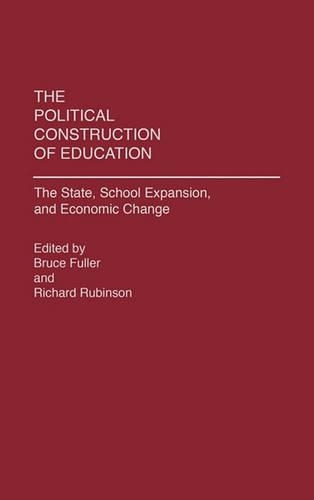
The Political Construction of Education: The State, School Expansion, and Economic Change
(Hardback)
Publishing Details
The Political Construction of Education: The State, School Expansion, and Economic Change
By (Author) Bruce Fuller
By (author) Richard Rubinson
Bloomsbury Publishing PLC
Praeger Publishers Inc
20th April 1992
United States
Classifications
Tertiary Education
Non Fiction
Sociology and anthropology
Central / national / federal government policies
Economics
370.19
Physical Properties
Hardback
280
Description
Political actors within the modern state - in both the West and the Third World - argue that more schooling can provide remedies for a variety of economic and social ills. But what is the state's actual efficacy in sparking demands for, and constructing effective forms of, mass schooling Is the state really an effective agent relative to educational demands originating from other institutions: competing economic interests, the family, and the school institution itself Under what institutional conditions does school expansion spur economic growth and change Since the 1960s, institutional and economic theorists have advanced responses to these important issues from three theoretical perspectives: functionalist human capital, class conflict, and world institution frameworks. This volume reviews historical work on these critical issues, conducted over the past two decades in the United States, Europe, and the Third World. Review chapters are complemented by reports of new findings - authored by a novel array of international economists, sociologists, and political analysts pulled together for this unusual initiative. Following a review chapter on the state's role in boosting mass schooling and economic change, part 1 focuses on the historical origins of literacy and schooling. Part 2 reports original work on national economic effects of school expansion, drawing on experiences from both industrialized and developing economies. Part 3 turns to the issue of how central states attempt to craft the supply of, and manipulate popular demand for, schooling. Practical implications are discusssed throughout.
Reviews
Mass schooling spread from Europe to the New World and then to Third World countries as political leaders visualized schooling as a means of curing many of the ills of society. The schools, which have spread around the globe, are strikingly similar regardless of the culture and economic conditions of the countries in which they have been institutionalized. Fuller and Rubinson have compiled 14 essays into a four-part book that addresses the critical question of what forces are driving the spread of mass schooling and discusses theories that attempt to describe the rise of mass schooling. Section 1 focuses on how popular demand for schooling transferred loyalty from the local community to the state. Section 2 looks at the relationship between the economy and the impact of schooling. Section 3 focuses on how economic conditions, class structures, and nonstate agencies impact the actions of the state in developing mass schooling. The last section addresses the institutional conditions that permit the state to play a creditable role in the expansion of schooling. This book has strong implications for students of educational policy development and public school finance. It will allow students to reflect on the reasons for schooling and the implications of schooling against commonly held beliefs.-Choice
There are many good nuggets in this collection. It could serve as a useful review of current research in school expansion, or as a supplementary reading in a course on development or the sociology of education.-Contemporary Sociology
"There are many good nuggets in this collection. It could serve as a useful review of current research in school expansion, or as a supplementary reading in a course on development or the sociology of education."-Contemporary Sociology
"Mass schooling spread from Europe to the New World and then to Third World countries as political leaders visualized schooling as a means of curing many of the ills of society. The schools, which have spread around the globe, are strikingly similar regardless of the culture and economic conditions of the countries in which they have been institutionalized. Fuller and Rubinson have compiled 14 essays into a four-part book that addresses the critical question of what forces are driving the spread of mass schooling and discusses theories that attempt to describe the rise of mass schooling. Section 1 focuses on how popular demand for schooling transferred loyalty from the local community to the state. Section 2 looks at the relationship between the economy and the impact of schooling. Section 3 focuses on how economic conditions, class structures, and nonstate agencies impact the actions of the state in developing mass schooling. The last section addresses the institutional conditions that permit the state to play a creditable role in the expansion of schooling. This book has strong implications for students of educational policy development and public school finance. It will allow students to reflect on the reasons for schooling and the implications of schooling against commonly held beliefs."-Choice
Author Bio
BRUCE FULLER is Associate Professor of Education at Harvard University. He has worked on social policy and economic issues at the World Bank and the U.S. State Department. His current research focuses on how states attempt to influence local schools and families. RICHARD RUBINSON is Professor of Sociology at Emory University. His research is concerned with political and economic change in the world-economy. He is presently investigating the political determinants and economic consequences of national educational change.
